By James Russell
As suggested most recently by Stephen Walt, a regrettable and recurring theme of the Obama Administration’s foreign policy in the Gulf and the Middle East over the last four years has been the lack of any sense of strategic priorities or objectives in the region. What lies [...]]]>
By James Russell
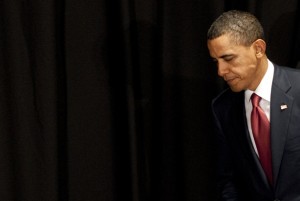 As suggested most recently by Stephen Walt, a regrettable and recurring theme of the Obama Administration’s foreign policy in the Gulf and the Middle East over the last four years has been the lack of any sense of strategic priorities or objectives in the region. What lies ahead for the president’s second term?
As suggested most recently by Stephen Walt, a regrettable and recurring theme of the Obama Administration’s foreign policy in the Gulf and the Middle East over the last four years has been the lack of any sense of strategic priorities or objectives in the region. What lies ahead for the president’s second term?
I wish I thought that the administration had (gasp!) actually examined the possibility of containment (remember the strategy that won the 50-year Cold War?) as a viable strategy both to convince Iran not to build its own nuclear weapon and/or deal with the Islamic Republic if it does cross the nuclear threshold.
But “containment” has now become a watchword for those concerned about the political correctness surrounding the terminology we are supposed to use to discuss strategy and policy options to achieve related objectives. Actual strategist Zbigniew Brzezinski was himself loathe to even mention containment during a recent speech about Iran because it’s becoming such a loaded political term.
The unfortunate truth is that this country can’t have any kind of real and informed opinion about whether to go to war with Iran until it decides on its strategic objectives and is prepared to subject its strategy to open and transparent debate in the marketplace of ideas. There was once a day when the Senate Foreign Relations Committee actually served this purpose. Imagine that!
Instead, we are today left with the Israeli lobby and its acolytes proclaiming a coming day of doom if Iran gets the bomb and the marginalization of commonsensical arguments from people like Walt and Paul Pillar who are asking the basic questions about strategic objectives that should be answered before the United States decides to go to war with Iran.
And, we are left with the Iraq war model in which attempts are simply made to present a case that war is somehow inevitable. Even more disturbingly, we are left with a legislative branch that seems mindlessly bent on pushing the country down the path to war, step by step, with its ever-tightening noose of sanctions that only increase the chances of war and Iran deciding that it has no choice but to build its own bomb.
In this void of strategic thinking, the Obama Administration seems to trundle along managing the inbox in a haphazard and unpredictable way.
Syria burns; the Israelis tell the US to get stuffed once more while fully ready to jam a JDAM down the throat of anyone that sneezes in their direction; Egypt could be descending into a dictatorship; Bahrain and the Gulf States teeter; Iraq falls into Iranian orbit — and that’s just the beginning.
But what is the Administration really worrying about, according to the press? Who exactly makes it onto the drone strike joint prioritized effects list (those to be assassinated). If ever there was a tactical problem in searching for a strategy, it is this issue — strategy turned on its head. How the president found himself picking out and/or participating in the monthly target list meetings (reminiscent of President Johnson in the 1960s) is frankly mind-blowing, but says a lot about the lack of strategic direction for a country that is still the leader of the free world.
How do we explain this lack of direction? It’s easy to blame advisers on the National Security Council who are not strategists and the fact that we are now “between” new cabinet secretaries. It’s easy to blame our regional brain lock by the Israeli lobby. It’s easy to blame a disinterested public and their elected representatives. All of these have in some way contributed to the current state of affairs in which a straightforward and commonsensical argument by a Stephen Walt vanishes into the proverbial wind. This is all true — except that it’s been a hallmark of the last four years. The US has essentially “made it up” as it went along.
I wish I could say that I thought the next four years would be different, and I fear for the future and the prospect of more ill-advised wars started for spurious and stupid reasons that are disconnected from well thought out strategy and policy.
- James Russell is an associate professor in the Department of National Security Affairs at the Naval Postgraduate School in Monterey, California. From 1988-2001, Mr. Russell held a variety of positions in the Office of the Assistant Secretary Defense for International Security Affairs, Near East South Asia and the Department of Defense. The views in this post are his alone.
]]>With President Barack Obama winning re-election, foreign policy analysts here are pondering whether his victory will translate into major changes from the rather cautious approach he followed overseas in his first term.
For now, speculation is focused primarily on the Middle East, the region that has dominated the international agenda [...]]]>
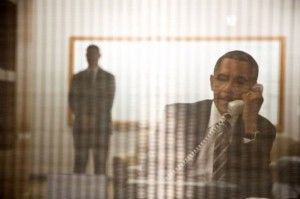 With President Barack Obama winning re-election, foreign policy analysts here are pondering whether his victory will translate into major changes from the rather cautious approach he followed overseas in his first term.
With President Barack Obama winning re-election, foreign policy analysts here are pondering whether his victory will translate into major changes from the rather cautious approach he followed overseas in his first term.
For now, speculation is focused primarily on the Middle East, the region that has dominated the international agenda since 9/11, much to the frustration of those in the Obama administration who are hoping to accelerate Washington’s “pivot” to the Asia/Pacific, especially in light of growing tensions between China and Japan and the ongoing political transition in Beijing.
Others are hoping that Obama will be willing to invest a fair amount of whatever additional political capital he gained from his victory on reviving international efforts to curb global warming, a challenge that thrust itself back into public consciousness here with hurricane-force winds as “Super-Storm Sandy” tore up much of the northeastern coast, including lower Manhattan.
Indeed, long-frustrated environmental groups seized on Obama’s allusion to the “destructive power of a warming planet” in his Chicago victory speech early Wednesday’s morning as a hopeful sign that the president, who hardly mentioned the problem during the campaign for fear of key coal-producing swing states, notably Ohio, may make climate change one of his “legacy” issues.
“President Obama’s legacy will be shaped by his ability to take on big challenges, including climate change, clean energy, environmental protection, and sustainability,” said Andrew Steer, president of the World Resources Institute (WRI).
As with climate change and other issues with major domestic implications, however, Obama will be constrained by certain political realities, most notably the fact Republicans will still hold a solid majority in the House of Representatives and 45 seats in the Senate, enabling them to effectively block any legislation to which they are strongly opposed.
“You’ve had an election that more or less preserves the status quo in the House,” noted Charles Kupchan, a foreign policy expert at the Council on Foreign Relations. “At a time when Obama’s top priority is getting the economy going, I’m not sure we’ll see a major initiative on climate change.”
And, while Obama won a sturdy majority of the electoral vote, his margin in the national vote is unlikely to exceed three percent when all the votes are counted. As a result, the institutional and partisan balance of power remains much the same as before the election.
Moreover, the fact that foreign policy did not play much of a role in a campaign dominated by the economy – only five percent of voters told pollsters as they left the voting booth that foreign affairs was the most important issue facing the country – suggests that Obama cannot claim a clear mandate for major policy changes.
Still, the fact that his Republican challenger, Mitt Romney, dropped his earlier hawkish, neo-conservative rhetoric as the election approached and essentially embraced Obama’s general policy approach, including even in the Middle East, in the closing weeks of the campaign was taken by some as a green light, if not a mandate, to pursue the president’s instincts.
“The election campaign, and not only the outcome, should be seen as the rout of the neo-conservatism of the disastrous 2001-2006 period of the Bush administration and the consolidation of a broad, bipartisan foreign policy consensus,” wrote Middle East analyst and occasional White House adviser Marc Lynch on his foreignpolicy.com blog Wednesday.
He predicted that what he called Obama’s “caution and pragmatism” in the region, particularly with respect to generally supporting democratic transitions, seeking ways to convene Israelis and Palestinians, engaging moderate Islamists, and pursuing Al-Qaeda and its affiliates, is unlikely to change, although he suggested that bolder approaches in some areas were called for.
In particular, the administration should begin “serious efforts at real talks with Iran” on its nuclear programme and “be prepared to take yes for an answer,” he wrote, echoing a consensus among realists in the foreign policy establishment that Obama will have greater flexibility to strike a deal with Tehran now than at any time in the last two years.
Reports of back-channel talks between the U.S. and Iran in preparation for a new round of negotiations between Tehran and the so-called P5+1 powers after the election have been circulating for two weeks.
Lynch also called for Washington to get behind a major push to unify the two main Palestinian factions and “encourage the renewal of a peace camp in the upcoming Israeli election” in hopes reviving serious efforts to achieve a two-state solution – a recommendation that also been urged by many analysts disappointed by Obama’s failure over the last two years to apply real pressure on Israel to halt the growth of Jewish settlements in the West Bank and East Jerusalem.
Since 2010, Obama and his fellow Democrats have avoided confronting Israeli Prime Minister Benjamin Netanyahu – who made little secret of his support for Romney – on either issue in major part because they felt their re-election chances depended heavily on the neutrality, if not the goodwill of the powerful Israel lobby.
Remarkably, however, those fears appear to have proved largely unfounded. Despite the expenditure of tens of millions of dollars in swing states on ads by the hard-line neo-conservative Republican Jewish Coalition and the Emergency Committee for Israel, as well as repeated charges by Romney that Obama had “thrown Israel under the bus,” 70 percent of Jewish voters opted for the president – a result that suggested that at least those hard-line neo-conservative elements of the lobby most closely tied to Netanyahu and the settler movement were not nearly as powerful as generally believed.
If so, Obama may have more room for manoeuvre on both Israel-Palestine and Iran, if he chooses to exercise it, than he himself previously thought.
Indeed, the election results were greeted with some considerable anxiety by Netanyahu’s supporters both here and in Israel.
“(R)emember that Obama is deeply committed to three things: global nuclear disarmament, rapprochement with the Islamic world, and Palestinian statehood,” wrote David Weinberg Wednesday in Israel Hayom, an Israeli newspaper funded by U.S. casino billionaire Sheldon Adelson, a major Netanyahu backer who also funded the election ads against Obama.
“I believe that he will forcefully act to progress on all three fronts, and this could bring him into conflict with Israel,” he added. “So start filling your sandbags. We’re in for a rough ride.”
Moreover, surveys of Jewish voters nationwide and in the swing states of Ohio and Florida commissioned by J Street, a “pro-peace” Zionist group, found that Obama’s tally among Jewish voters was only four percent less than in 2008 – roughly the same proportionate loss he suffered among virtually all demographic groups, except Latinos, who increased their support for the president significantly compared to four years ago.
The surveys also found overwhelming (79 percent) support for the creation of a Palestinian state in the West Bank and Gaza and East Jerusalem, 76 percent support for an active U.S. role in negotiating a settlement, as well as a significant plurality for continuing diplomacy with Iran.
Still Kupchan believes Obama is unlikely to aggressively challenge Netanyahu, especially on the Israel-Palestinian issue.
“I think the chances of a major push on the peace process are slim,” said Charles Kupchan, a foreign policy expert at the Council on Foreign Relations. “That would happen only if there is an opening of sorts in the region or if it comes primarily from within Israel and a shift in the electoral landscape there that gives it Netanyahu an incentive to do something bold.”
But he, too, predicted that Obama will try harder to reach some agreement with Iran in the coming months while continuing to resist intervention – especially military intervention – amid the continuing turmoil in the Arab world.
“The one place you’ll see a growing footprint and presence and growing activism,” he said, will be in Asia, especially if “things heat up more over territorial disputes between China and its neighbours. And the new Chinese leadership may pursue a more confrontational stance which could in turn invite an American response in kind.”
]]>On the eve of Monday’s foreign policy debate between President Barack Obama and Republican challenger Mitt Romney, the electorate appears increasingly disillusioned with the so-called Arab Spring, according to a new survey released by the Pew Research Center here.
A majority (57 percent) of the more than 1,500 respondents said [...]]]>
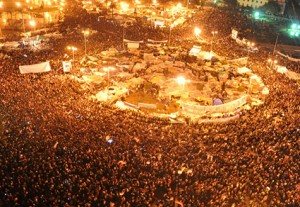 On the eve of Monday’s foreign policy debate between President Barack Obama and Republican challenger Mitt Romney, the electorate appears increasingly disillusioned with the so-called Arab Spring, according to a new survey released by the Pew Research Center here.
On the eve of Monday’s foreign policy debate between President Barack Obama and Republican challenger Mitt Romney, the electorate appears increasingly disillusioned with the so-called Arab Spring, according to a new survey released by the Pew Research Center here.
A majority (57 percent) of the more than 1,500 respondents said they do not believe that recent changes in the political leadership of Arab countries will “lead to lasting improvements” for the region, while only 14 percent – down from 24 percent 18 months ago – said they believe the changes will be “good for the United States”.
Nearly three out of four voters said the changes will either be “bad” for Washington (36 percent) or won’t have much of an effect either way (38 percent).
Both positions could favour Romney and the Republicans who, since last month’s killing of the U.S. ambassador to Libya and three of his staff in Benghazi, have argued that Obama’s policy toward the Arab world is unraveling.
Friday’s killing in Beirut of Lebanon’s top intelligence officer and at least seven other people could add to that perception, as Col. Wissam al-Hassan was aligned with the “March 14” coalition, a Sunni-led faction with close ties to Washington and strongly opposed to the Al-Assad regime in Syria.
The poll, which was conducted Oct. 4-7, also found a somewhat tougher position toward both Iran’s nuclear programme and on China’s trade policies.
Monday’s debate, the third and last in a series between the two candidates before the Nov. 6 election, is not expected to draw the huge television audiences – over 65 million people – of the last two, due to the relative lack of interest in foreign policy compared to domestic issues, especially the economy.
“While foreign affairs had had a higher profile recently, this is a campaign dominated by domestic issues,” according to Pew’s director, Andrew Kohut, who noted that only seven percent of respondents in another recent Pew poll cited foreign policy as a major priority compared to 41 percent when George W. Bush ran for re-election in 2004.
“The public is decidedly more isolationist than in some time,” he said, in part as a result of a lessening of “concern about terrorism as a national-security threat.”
The new poll got considerable media attention when it was released here Thursday because it showed Romney cutting deeply into the long-held lead sustained by Obama over many months in surveys that asked which candidate they trusted most to conduct the nation’s foreign policy.
In early September, a Bloomberg poll found that Obama led Romney by a 53-38 percent margin on this question, but Thursday’s Pew poll found that margin reduced to 47-43 percent in Obama’s favour. While Republicans leapt on the poll as evidence that their recent attacks on Obama’s Middle East policy – focused primarily on his administration’s alleged failure to respond to requests by its embassy in Tripoli for enhanced security – were drawing blood.
But Kohout suggested Friday that Romney’s gains were probably due more to Obama’s poor performance in the first debate, which took place Oct. 3, the day before Pew began polling, than to disillusionment with Obama’s foreign policy.
Noting that Obama is generally seen has having won the second debate Tuesday. “On the next poll, I expect Obama to do better on foreign policy,” he said, noting that polls over the past year have found consistently found foreign policy to be Obama’s strongest suit.
Monday’s debate is expected to centre on a number of key issues, particularly U.S. policy in the Middle East and Afghanistan and, to a somewhat lesser extent, on the most effective approach toward China, especially its trade and monetary policies about which Romney has been particularly hawkish on the campaign trail.
NATO and Russia under President Vladimir Putin, which Romney has called Washington’s “Number one geo-political foe”, are also expected to get some attention, possibly along with climate change which has been almost entirely ignored by both candidates in the campaign so far.
The main findings of the new poll include strong skepticism over whether the leadership changes in the Middle East will benefit either the local population or the U.S. Asked which was more important in the region – democratic governments and less stability or stable governments with less democracy, a 54 percent majority opted for the latter.
On Iran, the public appears to be somewhat more hawkish than 10 months ago. Asked whether, with respect to Iran’s nuclear programme, it was more important to “take a firm stand” against it or “to avoid military conflict with Iran, 56 percent opted for a “firm stand” – which, however, did not explicitly mention a military attack – six percent more than when the same question was asked last January.
Respondents were split equally over on the question of whether Obama or Romney, who is perceived as taking a more hawkish line on Iran, would be best in dealing with Iran’s nuclear programme.
Romney, who has promised to declare China as a “currency manipulator” on his first day in office and presumably follow up with sanctions, got his greatest support on the question of who would best deal with China’s trade policies. Forty-nine percent cited Romney compared to 40 percent for Obama whose “China-bashing has been somewhat more restrained during the campaign.
Indeed, the campaign appears to have contributed to a generally more hawkish attitude toward Beijing on economic issues. In March 2011, 53 percent of respondents said “building a stronger relationship” with China was more important than “getting tougher” with it on economic issues. Those figures are now practically reversed, with 49 percent favouring the second option and only 40 percent the first.
On the other hand, Obama’s main advantage was in dealing with political instability the Middle East by a 47-42 percent margin.
That may reflect popular support for what Republicans mock as Obama’s alleged preference for “leading from behind” in the region. Only 23 percent of respondents said they believe the U.S. should be “more involved” in fostering leadership changes in the Middle East, while a whopping 63 percent – including 53 percent of Republicans – said they believe Washington should be “less involved”.
Romney has generally favoured somewhat more interventionist policies in the region, notably with respect to arming rebels in the civil war in Syria.
On Israel, a plurality believes that current U.S. support for the Jewish state is “about right” as opposed to 22 percent who believe that Washington is too supportive, and 25 percent who think it has not been supportive enough.
The poll confirmed a major partisan divide on this question: 46 percent of Republicans believe U.S. policy has not been sufficiently supportive. “White evangelicals are extremely committed to Israel,” noted Kohout, who added that they form about 40 percent of the Republican base.
As in other recent surveys, the latest poll found major differences between the so-called millennial general – adults under age 30, and other age groups. On the question of Iran’s nuclear programme, for example, a 49 percent plurality of millennials preferred to “avoid military conflict”, while only 24 percent of those 65 and older take that position.
Similarly, on economic policy toward China, 70 percent of millennials favour stronger relations with Beijing instead of “getting tougher”. Only 41 percent of those 65 and older agreed.
“[The millennials] have a very different worldview,” said Kohout. “This is a much more liberal, Democratically disposed generation.”
A major challenge faced by the Obama campaign is to get millennials to the polls, as their abstention rate has been significantly higher than any other age group
]]>In a recent Fox News article, the American Enterprise Institute’s Michael Rubin presents an issue that will consume Middle East policy makers for decades: “Is There Really Democracy in the Middle East?” He’s apparently not interested, however, in serious analysis of that question. Instead Rubin offers a partisan polemic [...]]]>
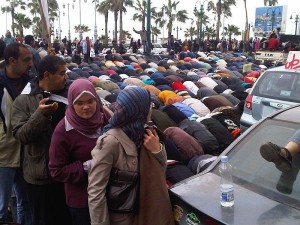 In a recent Fox News article, the American Enterprise Institute’s Michael Rubin presents an issue that will consume Middle East policy makers for decades: “Is There Really Democracy in the Middle East?” He’s apparently not interested, however, in serious analysis of that question. Instead Rubin offers a partisan polemic criticizing the Obama administration’s responses to the Arab Spring and last week’s events in Benghazi.
In a recent Fox News article, the American Enterprise Institute’s Michael Rubin presents an issue that will consume Middle East policy makers for decades: “Is There Really Democracy in the Middle East?” He’s apparently not interested, however, in serious analysis of that question. Instead Rubin offers a partisan polemic criticizing the Obama administration’s responses to the Arab Spring and last week’s events in Benghazi.
Rubin dismisses as “initial optimism” Secretary of State Clinton’s September 2011 description of a “US strategy… based on America’s experience at the end of the Cold War, helping countries that are moving to democracy.” For Rubin, the Arab Spring is far different. Last week’s violence in Benghazi was “equivalent to…Robespierre unleashing the Reign of Terror in the chaos…following the 1789 storming of the Bastille that began the French Revolution.” He argues that President Obama was annoyed “with analysts who suggested that Islamists might hijack the uprisings” and “directed his aides to discount parallels to Iran and focus instead on comparisons to Eastern European transitions after 1989” instead. He goes on to add, in a dramatic tone channeling the stentorian tones of Orson Welles, that “the Islamist putsch continues…as the Muslim Brotherhood…filled the vacuum” in Tunisia and Egypt after their respective dictators abdicated.
Unfortunately, Rubin can only offer a hardly realistic alternative. He suggests that we “ask whether democracy is even possible in the region” because Islamists will inevitably hijack it, as he states they already have in Egypt, Tunisia and Libya. And since he refers to the French Revolution more than once (but in misleading comparisons), it is appropriate to characterize Rubin’s policy preference in those terms. He seems to deny the Arabs who removed their autocratic regimes the legacy of the French Revolution that we in the West have enjoyed for two centuries. Historians define almost unanimously this legacy as including the basic rights of man and citizen, the right to free and fair elections, an end to feudalism and hereditary privileges, the equality of all men under the law, and free speech and thought.
Despite Rubin’s version of the Obama administration’s missteps, can anyone identify any Middle East policy makers in or out of government, in the US or abroad, who do not agree with Rubin’s Kuwaiti academic, Saad al-Din Ibrahim, when he says that “It’s understandable the Muslim Brotherhood won… after years in opposition they could promise constituents the world?”
Inconveniently for Rubin, we in the West bear some responsibility for the unique domestic popularity of Islamist parties within Middle Eastern nations. Rubin understands the strength of Islamists in Arab societies today but chooses pointedly to ignore the reasons for their presence. During the Cold War, the region’s autocrats attracted Western aid by suppressing the left. Autocrats promoted Islam as a domestic bulwark against leftist movements. Israel even adopted this tactic. As is commonly reported, Israel provided Hamas support to grow into an alternative to leftist Palestinian organizations. After the fall of communism, Arab autocrats maintained American support by ensuring that their domestic opposition could not interfere in negotiating peace agreements with Israel.
Rubin also complains that the Administration is “treating American aid as an entitlement for hostile regimes.” The last time I checked, Egypt, Tunisia, and Libya are not enemies of the United States. No doubt, elements within their societies are, but elements like these also exist in Eastern Europe and among other US allies. Rubin’s complaints about American financial aid “appeasing” the newly elected regimes discounts the possibility that they may truly enjoy majority support from their electorates. Moreover, the US has provided aid to foreign nations to enhance American interests for decades; it’s not charity.
Since Rubin expects any administration to ensure a continuance of American influence in the region, the Obama administration’s early support for the Arab Spring, its assistance to the Libyan Revolution and financial aid, are among the tools the US must continue to employ; “big sticks” are no longer an appropriate option. Rubin also ignores elements within these countries that can serve as US allies such as the Egyptian army and the thousands of Benghazi residents who ejected Islamist militias from the city the other day. His account of the Benghazi violence never mentions that dozens of Libyans tried to help the beleaguered diplomats.
Rubin’s main problem seems to be with Middle Eastern democracy itself. He seems truly unsettled by the results of free elections. But democracy can be messy; its initial baby steps messier still. Sometimes your friends don’t win. There is no evidence that Islamists stole the Egyptian elections. President Mohamed Morsi may have won the freest and fairest election in the country’s history. It would be much worse for the US, presuming a monopoly on democratic perfection, if it were to deny it to others. The US is fortunate as of yet to remain relatively untarnished by the West’s history of predatory and lethal activities throughout Asia, Africa, and the Middle East. Perhaps, unlike in Iran, the US can reap the wind without sowing the whirlwind.
]]>The notion of linkage contends that a festering Arab-Israeli conflict takes a strategic toll on the U.S. in the Middle East.
In an Congressional testimony, CENTCOM head Gen. James Mattis [...]]]>
The notion of linkage contends that a festering Arab-Israeli conflict takes a strategic toll on the U.S. in the Middle East.
In an Congressional testimony, CENTCOM head Gen. James Mattis said that while Israel and the Occupied Territories are outside of his purview, they affect “U.S. security interests in the region.” He described a two-state solution in the Israeli-Palestinian conflict as “the only reliable path to lasting peace in this region.”
The CENTCOM Area of Responsibility includes nearly all countries in the Middle East and Central Asia.
Here’s the relevant bit from Mattis’s testimony before the Senate Armed Services Committee, via the American Forces Press Service:
Mattis said while Israel and Palestine aren’t in CENTCOM’s area of responsibility, lack of progress toward a comprehensive Middle East peace affects U.S. security interests in the region.
“I believe the only reliable path to lasting peace in this region is a viable two-state solution between Israel and Palestine,” he said. “This issue is one of many that is exploited by our adversaries in the region, and is used as a recruiting tool for extremist groups.”
By contrast, Mattis said, substantive progress in the peace process would improve CENTCOM’s opportunities to work with regional partners and support multilateral security efforts.
UPDATE: An earlier version of this said Mattis was interviewed by AFPS. Instead, the comments were made in Congressional testimony, which the article now reflects. A more broad quote of Mattis’s comments, as well as video of his testimony, can be found at the website of Americans for Peace Now.
]]>1 – Some government media figures appear to be joining ranks with the protestors. Mahmoud Saad, a talk show host in the Egyptian state-run TV, has announced that he will no longer appear on TV starting tonight after he came under [...]]]>
1 – Some government media figures appear to be joining ranks with the protestors. Mahmoud Saad, a talk show host in the Egyptian state-run TV, has announced that he will no longer appear on TV starting tonight after he came under pressure from top government officials to report “untruths” about the protests.
Mahmoud Saad, a popular TV host, has told other journalists that his disappearance from his daily show, Masr El-Naharda (Egypt Today), comes in protests against pressure to defame protestors as rioters “destroying the country.”
The state is clearly starting to launch a media campaign against the protests. My guess is that they will try to scare off the rest of Egyptians from joining the protests in the future by labeling protestors “saboteurs.”
2 – Police continued to arrest women in big numbers. This is noteworthy because young Egyptian women, many wearing the veils and many others without it, are taking part in the demonstrations despite the violent crackdown by the police. I expect this to be a major contentious point that could push more ordinary to protest against the government that is arresting “their daughters.” In this generally conservative society, women are often treated with more respect and are often shiled from dealing with the brutal and abuse police members. It shows how nervous the government is. They are starting to cross some extra red lines.
3 – The government has stepped up its security response across the country with dozens of armored vehicles visibly deployed around important buildings in Cairo including the TV and Radio building overlooking the River Nile and several ministerial offices. There will be more beatings, arrests and rubber bullets. More injuries and, worse, even deaths if that pace continues.
4 – The government has co-opted labor unions. Sources inside the labor unions say that they now have directions from the Interior Ministry to work to foil any activities by independent labor leaders.
5 – The Egyptian government hasn’t responded politically to any of the demands of the protestors. The government has cut or removed subsidies for many staple goods in a country where millions survive on less than two dollars a day. Just before the protests broke out on Tuesday, the government was preparing to cut energy subsidies, a move that would have hiked prices even further. The health ministry was also planning to cut its public health care coverage, limiting the hours at public hospitals were patients could be seen for reduced fees. No word on whether that will change or not. For now, they are ignoring all calls for change.
Emad Mekay
Cairo, Egypt
Two journalists were arrested: Yehia Qalash, who is a member of the union board, and Mohammed Abdel Qodoos. Qalash was released later on, but Abdel Qodoos is still in custody.
This is the second day of protests with far more police presence. Security is more intense outside important buildings including the TV and Radio building overlooking the River Nile. Soldiers look ready for a fight today.
In the industrial city of Mahala, police virtually cordoned off the city. My sources in the city tell me the police ordered early dismissal of textile factory workers to preempt any organized protests of workers after work. They also blocked all traffic to some streets leading to the city center square, Al-Shoon Sqaure, where thousands demonstrated yesterday.
The protests are not asking for anything specific this time. They want the government out. It is that general.
]]>I decided to visit my Nicaraguan friend who stays in a village called Fougamou, in central Gabon. So I looked up the nearest town, Lambaréné. It turned out to have a museum honouring Dr. Albert Schweitzer, who arrived there in 1913, built a hospital, and won a Nobel Peace Prize in 1952.
I [...]]]>

The Ogooué River seen from Dr. Schweitzer's home. Photo: M. Sayagues
I decided to visit my Nicaraguan friend who stays in a village called Fougamou, in central Gabon. So I looked up the nearest town, Lambaréné. It turned out to have a museum honouring Dr. Albert Schweitzer, who arrived there in 1913, built a hospital, and won a Nobel Peace Prize in 1952.
I had never been interested in him but it seemed like a truly off-the-beaten path museum, just my kind. But what sold me on Lambaréné was the name of its river: Ogooué. I HAD to see a river with such a wondrous name.
So I set off to Lambaréné on my way to Fougamou. Believe me, I was in the green heart of Africa. Green, as in rainforest.
I am glad I went. The river is awesome. The museum is charming. It preserves the old hospital and personal quarters from the 1920s as they were originally. Next is the modern hospital, which attends to 80,000 consultations and 6,000 hospitalized patients every year, and continues to practice what I believe was Schweitzer’s most creative medical idea: to welcome the African family, with place to wash, cook and sleep, in a hospital-cum-village.
True, the relatives provided – and still do – free labour. Also true, it is mostly women and girls who provide this free labour. In Gabon and elsewhere, caring for the sick and, increasingly, for the elderly, is women’s work.
In AIDS-ravaged Southern Africa, caring for the sick has put a burden on women and girls that is unthinkable to Western health consumers.
So huge, that the campaign Making Care Work Count lobbies governments for recognition and support of carers – who are subsidizing governments with their work, with little help, making up for woefully inadequate health budgets.
Notwithstanding the gender bias, to include the relatives in hospital design is much better than making them sleep on the street pavement, as I’ve seen in Luanda’s hospitals.
It also reflects a recognition that in Africa medicine must incorporate cultural and social meanings; that it can’t isolate the individual from the collective; that the meaning of disease is part of a bigger reality.

Yeyette and Joel Boko
I travelled from Libreville, 300 kms away, in a taxi-brousse. The first to get in was with Yeyette Boko. She was worried to tears about her husband, Joel Boko, who was in Lambaréné being treated for an ulcerous thigh. He needed a graft. So Yvette had wrestled a two-week leave from her employer to be with him.
She breezed into his room: “Mon chéri, I missed you so much!” They snuggled on the bed and called their four-year-old son, who was staying with an aunt in the capital.
Next day I visited again. Yeyette had cooked a hearty meal. He seemed stronger. They looked happy.
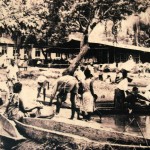
The old landing by the hospital-village.
Read about worldwide efforts to measure and pay women’s unpaid care work
]]>